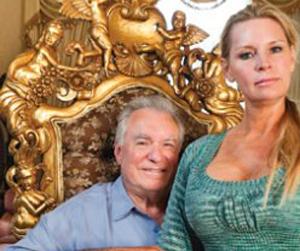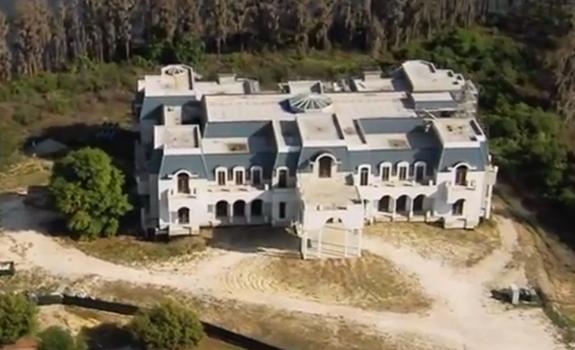 NEWS
NEWSOK! Investigates: Who Is David Siegel? The Rise And Fall—And Rise Again—Of The Queen Of Versailles Time Share Mogul

May 31 2013, Published 4:36 a.m. ET

The Queen of Versailles was the must see documentary of 2012, detailing the riches to rags story of David and Jackie Siegel —following their every day lives as they worked on the construction of their super gaudy mega mansion in Florida.
When the documentary ended the Siegels were on the brink of bankruptcy as David's time share business suffered financial fall out from the recession and the couple was forced to halt work on their American homage to the French Palace of Versailles as the bank placed the 90,000 square foot home in foreclosure.

But, one year on and the Siegels are back!
OK! Exclusive: Part 1 Of Our Interview with The Queen of Versailles
As OKMagazine.com previously reported, construction has started once again on the Florida mansion—which, when completed, will boast nine kitchens, thirty bedrooms, twenty-three bathrooms, three pools, two bowling alleys, a disco, roller rink, two tennis courts, three hot tubs, 30-car underground carport, expansive wine cellar, bomb shelter, two game rooms, two movie theaters, a grand hall with a 30-foot stained glass dome and $5 million of marble—so how did David Siegel claw his way back from the edge?
OK! Investigates: Jenelle Evans' Net Worth
In a special OK! Investigates feature, we document exactly how the 78-year-old business man, who takes personal credit for George W Bush's election win against Al Gore in 2000, went from rags to riches back to rags and then once again to riches—albeit in the millions rather than the billions of yesteryear.

Siegel loves to boast about his "humble beginnings" waxing lyrical about the good old days during an interview with Orlando Weekly back in 2000.
OK! Investigates: How Much Is Farrah Abraham Worth?
"In 1953 -- no, it was 1954 -- I opened my first TV store in Coconut Grove. It was called Grove TV," Siegel told the Florida paper, who report that while attending the University of Miami, Siegel kicked off his financial empire by charging friends a small fee to have their TVs fixed by the University's professors.
A short time later Siegel had progressed to owning a store of his own in Liberty City and hiring a fleet of salesmen who sold refurbished televisions to the local African-American residents for a $10 down payment and weekly payments of $5.

"I only had about $10 in each one," Siegel boasted of his profit margin.
OK! Investigates: How Much is Leah Messer Worth?
His savvy business sense soon netted him three stores and a gas station, but his growing empire crumbled after he was called for Air Force duty in 1961.
Six months out of service though and Siegel says he was back up and running again with a new store, bringing in even higher profits than before!
Want OK! each day? Sign up here!
Then tragedy struck—Siegel closed the store after one of his salesmen was killed by a customer and he quickly fell into a depression that led to his home being placed in foreclosure.
OK! Investigates: How Much is Chelsea Houska Worth?
Thankfully for Siegel, his best friend rallied to his side and pulled him out of his funk, and he was back up and running again in no time, opening an appliance store and installing TV antennas.

Next up Siegel purchased his father's old store, which, he tells the Orlando Weekly, soon became, "like a mini Kmart."
Then the real money making started!
OK! Investigates: How Much Is Kailyn Lowry Worth?
In 1968 Siegel started selling land for a series of companies before investing in his own 1,280-acre plot, which he quickly learned he could maximize the profit on by subdividing it.
Around that time Siegel also purchased an 80-acre orange grove, which soon stared bringing in a whopping $100,000 a year in orange sales alone!

In 1980 Siegel learned the concept of time sharing and two years later formed his company Westgate and opened his first 16 units.
OK! Investigates: Find Out What the Real Housewives Get Paid
By 2000 Westgate included five resorts and was turning over $300 million in annual sales.
At the time Queen of Versailles started filming in 2010 Siegel's empire had grown to 28 resorts and gross revenue of $1 billion a year.

Fast forward one year and the collapse of the housing market and the recession placed Westgate, and Siegel, in a perilous financial position.
OK! News: Why Many Child Stars Don't Make It Out Of Hollywood Alive Or Sane
Siegel was forced to make mass layoffs throughout the company, reducing the payroll from 12,000 to 5,000 people, and to drastically reduce overheads and expenditure.
Many people found themselves out of work and the company even faced bankruptcy at one point, but Siegel says the cost-cutting measures worked and that now they are back to making more profit than ever!

"We got lean and mean," he told Reuters last year, projecting $500 million in gross sales for 2012.
OK! Investigates: How Stars Go Broke!
"We're basically doing what the whole country should be doing. We're living within our means. The company today is more profitable than it was back in its heyday of 2008 in terms of actual profit. We're more profitable today than we have been in our history."
However, not everybody is as happy as Siegel about his phoenix like rise from the ashes—approximately 365 ex-sales agents only recently settled a six-year-long class action lawsuit against their former boss for unpaid commissions that were owed to them.
Meantime, Siegel is living large once again, with an estimated net worth of $100 million.
What do you think about David Siegel's rags to riches story? Sound off in comments below and tweet us @OKMagazine

